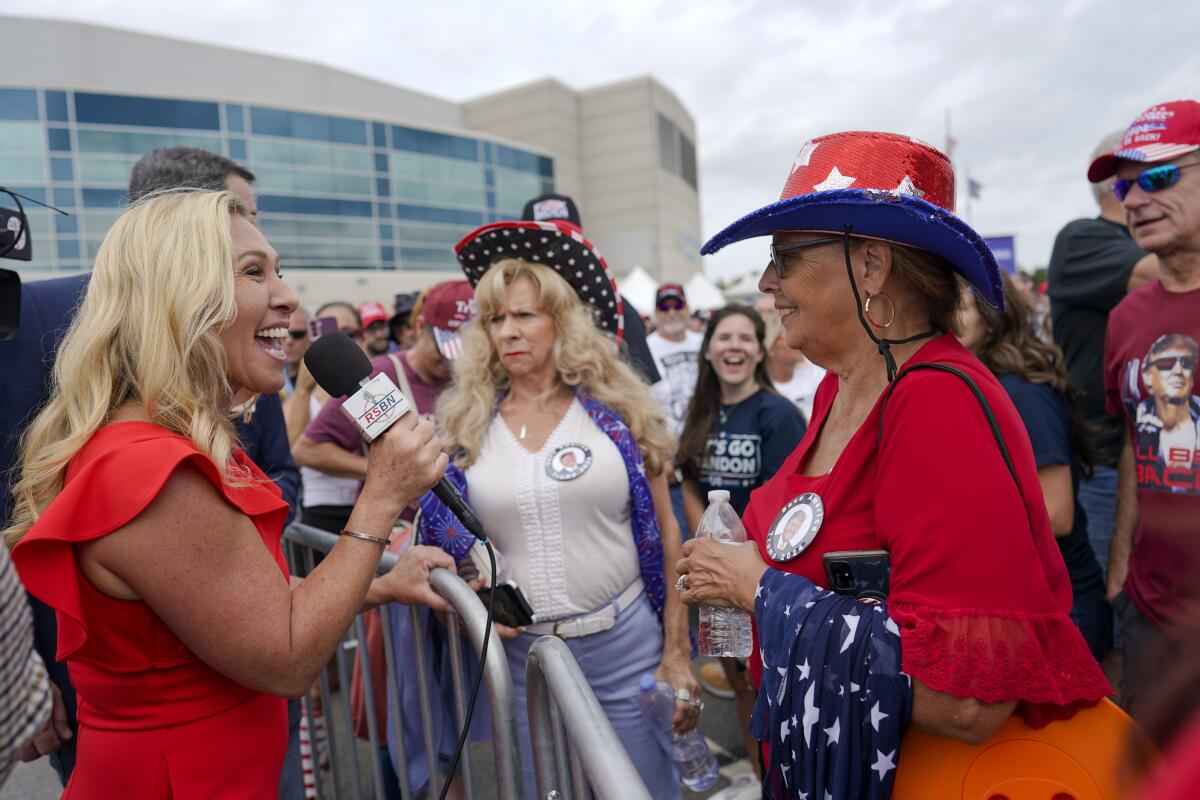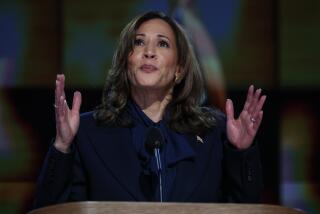Column: Is polarization a problem, or just a reality because the far right has lost its mind?

- Share via
What’s so bad about polarization?
I see the divides between factions of Americans as a troubling problem that we should all be striving to address. But lately I keep running into smart people who disagree.
Earlier this month, I was on a PEN World Voices Festival panel at the L.A. Central Library with author and TV producer Reza Aslan and Hollywood’s Black List founder Franklin Leonard. Each said focusing on “polarization” can promote a false equivalency.
Opinion Columnist
Jean Guerrero
Jean Guerrero is the author, most recently, of “Hatemonger: Stephen Miller, Donald Trump and the White Nationalist Agenda.”
“It is a fact that other Americans are a direct threat to my way of life,” Leonard said. “It is not a fact that my way of life is a threat to theirs.”
Aslan agreed: “I’m not sure what’s so wrong with polarization. I really don’t understand what the issue is … if the other person on the other side of the aisle doesn’t even understand my dignity as a human being, then I’m perfectly fine being in a different camp. Like I want polarization.”
Numerous recent stories in left-of-center media have been making similar cases: The problem isn’t polarization but, rather, the GOP-led assault on the rights of millions of Americans.
I agree that this assault is the bigger problem. But if it becomes a faux pas to care about the distance between us and the people who’d like to restrict our rights, how can we hope to overcome political stalemates and win basic protections — let alone progress? Polarization inhibits engagement with the other side, and engagement is how I’ve always imagined coalitions form to bring about change.
When so many smart people on “my side” are embracing this kind of distance, I have to wonder: Is it strategic? One recent Salon article in defense of polarization cited the Rev. Martin Luther King Jr.’s “Letter From Birmingham Jail.” So I read it.
From a jail cell in 1963 after his arrest for protesting segregation, the preeminent civil rights leader eloquently responds to white clergymen’s complaints that even though his protests were peaceful, they somehow still “incite to hatred and violence.”
King elucidates the absurdity of that claim, while acknowledging that his protests promote “constructive nonviolent tension.” He writes: “I must confess that I am not afraid of the word ‘tension.’ ”
For King, polarization wasn’t a problem. It was a necessary byproduct of the struggle for equality. But he refused an us-versus-them conception. The evil wasn’t the other side. It was some individuals’ decision to break with those who were different from them, rather than bridge divides. Birmingham leaders repeatedly made that choice by refusing to engage in good-faith negotiation with Black activists.
King is an often-cited figure among Republicans who like to twist his words to characterize affirmative action and reparations as racist. They’d benefit from revisiting his body of work. So would many liberals, who pay lip service to his faith in love as a transformative social force but cultivate a vitriol for opponents mirroring the MAGA faction’s.
In his 1958 book “Stride Toward Freedom,” the pastor wrote: “To meet hate with retaliatory hate would do nothing but intensify the existence of evil in the universe. Hate begets hate; violence begets violence; toughness begets a greater toughness.”
Violence takes polarization to an extreme. While some civil rights activists back then embraced violent tactics, it was nonviolent demonstrators who transformed public opinion and secured unprecedented legislative wins, alongside the NAACP.
“The people who advocated violence had no significant successes,” Gary Orfield, co-director of the Civil Rights Project at UCLA, told me. “When there were violent protests or riots like the Watts riots in Los Angeles, it empowered things like the rise of Reagan. It empowered an intense white reaction that went to support the conservative side.”
King warned against not only physical violence but also verbal violence and even against “internal violence of spirit,” including the impulse to humiliate our opponents. Activists underwent rigorous training to ensure they’d remain poised.
Many of today’s loudest progressives delight in humiliating their opponents, certain that they occupy the moral high ground even as they use the GOP’s tone and tactics. I’ve been there. I know the cheap points to be scored by shaming Republicans as a mass of fascists and neo-Nazis.
Vilification sells books, gets clicks, goes viral and turns ordinary Americans against one another. Ultimately, regardless of which side you’re arguing, stoking division with hate only props up the status quo.
It’s worth remembering that people on the “other side” are less extreme than we think; the public face of politics — on TV and Twitter — doesn’t represent the larger public, but its most fanatical parts.
When I called Aslan after our panel, he told me that when he referred to the “other side,” he was thinking of Rep. Marjorie Taylor Greene (R-Ga.) and her ilk, not the ordinary people manipulated by them. He believes many who fall for Greene’s paranoid narratives can be transformed through pop culture that humanizes their imagined enemies. The solution is getting to know the other: in real life, or even on TV.
I love the idea. But I wouldn’t count on Hollywood to solve things, given its obsession with violence and lack of racial diversity.
It’s going to take all of us. We must rekindle our faith in the humanity of our foes, and build relationships. We must recall that King’s nonviolent actions weren’t passive. They weren’t virtue signaling. They were arduously physical and dangerous. They cost King his life.
We must revive his ideas and salvage his dream. We need to have brave, empathetic, in-person confrontations with the other side. That’s how we wage love. If we interpret polarization as a sign that the other side isn’t worth our time, there’s no hope for transformation.












